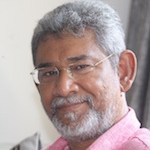
By Dayan Jayatilleka –
Since the Easter massacre had not taken place at the time, complicity in the Geneva 2015 resolution was one of the three major contributory factors that enabled a new political party, the SLPP (‘Pohottuwa’) to defeat both the UNP and the SLFP at the Feb 2018 local authorities election.
By 2019/2020, Geneva 2015 complicity was one of the four major factors (the Bond Scam, Geneva co-sponsorship, non-unitary Constitution, Easter massacre) contributing to the UNP’s electoral extermination and the gift of a supermajority through a tectonic shift of Sinhala sentiment towards the Gotabaya Rajapaksa option; a supermajority translated into structural unipolarity by the 20th amendment and to be upgraded to a systemic (and ethnoreligious) unipolarity by the new Constitution.
The main Opposition today deserves criticism, not because it had been part of the UNP and the Yahapalanaya government, but because as a new party under a new leader, it nonetheless– inexplicably–failed to disown this liability in Parliament during the Budget debate by declaring that the co-sponsorship of Geneva 2015 was under a previous (exiled) leader and (extinct) party.
The paradoxes of the main Opposition are many. In terms of its ideology and consciousness, the SJB, barring Sajith Premadasa, who bears a paternal ideological heritage, is not yet post-UNP; it is (still) para-UNP—at a time when the UNP of the past quarter-century has been electorally effaced.
When a party replaces its leader, its MPs hardly ever use as a reference point, the policies and performance of his/her predecessor and are at pains to use the opportunity to reinvent itself. This was so with the UNP when JR took over in 1973, Premadasa in 1988, Wijetunga in 1993, and Ranil in 1994, and even more markedly in the SLFP when CBK succeeded Mrs. Bandaranaike and Mahinda Rajapaksa succeeded CBK. The phenomenon of rebranding is even more dramatic a rupture when a new party is formed: SWRD’s SLFP, CBK and Vijaya Kumaratunga’s SLMP, Lalith-Gamini’s DUNF, MR and his siblings SLPP.
In the case of the SJB, it has a new leader, is a new formation, and its leader has repeatedly signaled that it’s program and trajectory are new. However, its parliamentarians continue, as the (JRJ) UNP of post-1973 and (Premadasa) post-1988 never did about the UNP governments of 1965-1970 and 1977-88, and certainly SWRD’s newly-founded SLFP never did about the UNP it broke away from, refer to “our government” and “during our time”.
The Ranil-Mangala co-sponsorship bought into and implicitly endorsed the report of the High Commissioner—as the absence of any criticism or dissent in defense of our armed forces and the basic legitimacy of Sri Lanka’s war of self-defense by Foreign Minister Samaraweera in his Sept 2015 Geneva address proved.
What makes this retro-chic so bitterly ironic and profoundly counter-productive, is that the Ranilist UNP heritage they find inescapable is one that has been rejected far more totally than has that of any other government in sri Lanka’s history. The Opposition and therefore democracy itself survive in Sri Lanka simply because Sajith Premadasa and today’s SJB members jumped into a lifeboat in the nick of time and rowed some distance from the UNP before it electorally exploded when the citizens’ vote-torpedo struck it, destroying everyone and everything on-board.
It is ridiculous that, while having the potential to found itself on the heritage of the best aspects of the UNP’s twin models (JR and Premadasa) during its long stint in office (1977-1993), ideologically incubated during the brilliantly successful years in Opposition after those two personalities took over the reins and party leader and deputy (1973-1977), the New Opposition looks back instead at the disastrous quarter-century of Ranil Wickremesinghe, an accidental leader like DB Wijetunga, who didn’t fight his way to the top unlike JR, Premadasa or Mahinda, but became the leader of the UNP only because Prabhakaran had killed all other contenders and never once troubled himself with an assassination attempt or plan as regards Wickremesinghe.
When Ranasinghe Premadasa ran for President and won (1988), he had long since dumped the UNP government’s baggage overboard.
As for foreign policy in general and the Opposition’s international line in particular, it must grasp that during the war and immediate postwar years, the threat to our sovereignty came from the West and therefore a relative shift in the balance to China coincided with our interests, but today, the recent overassertiveness of the rising China combined with and fueling the creeping despotism of the Sri Lankan regime itself, recall us to the situation of the 1930s, when the revisionist powers even in Asia, posed more of a threat to the peoples of Asia (as Mao and Ho Chi Minh clearly emphasized) than did the established Western democratic-imperialist powers. Thus, it is in our most fundamental interests today that the Biden-Harris led administration succeeds in containing the political model of China within its borders.
We may well see the USA heading up a far broader united front than China is capable of. The political values of the Democratic administration of the USA have far more in common with Sri Lanka’s own democratic ethos than that of the Chinese Communist Party in its most recent phase.




old codger / December 1, 2020
“complicity in the Geneva 2015 resolution was one of the three major contributory factors that enabled a new political party, the SLPP….”
Is Dr DJ angling for the Team Leader job in March 2021 in Geneva? I am sure by then he will have managed to redefine Gota as a “Gramscian- Bolivarist progressive ” or something equally complicated.
/